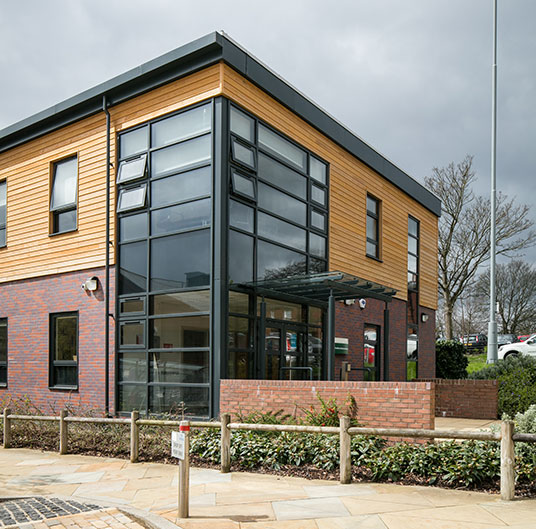Technological innovation has led to offsite construction methods becoming faster, safer, more environmentally friendly and efficient. The University of Leeds’ Facilities Directorate building is a striking example of offsite construction techniques delivering superior standards and enhanced capabilities through Western Building Systems’ fully integrated offsite modular approach.
Established in 1904, the University of Leeds currently has a student population of 33,500, making it one of the biggest in the UK. On the back of growing demand for an efficient space to house the Facilities Directorate, the University appointed Western Building Systems to construct a brand-new building within the city-centre campus. The Facilities Directorate is responsible for the maintenance and development of the University Estate, the Commercial and Campus Support Services and Sustainability Services at the University, and therefore required a multifunctional space.
Building on knowledge from extensive experience within the education sector, Western Building Systems successfully produced building solutions engineered to create a dynamic space fit for the Facilities Directorate. With a project value of £2.3m the completed building is a streamlined two-storey building with stunning traditional accents of brick and cedar cladding. It is almost impossible to tell that it is in fact a modular building,
comprised of a two-storey steel frame and tailored panels which were constructed offsite, almost 400 miles away at Western Building Systems’ purpose-built manufacturing facility.
Offsite integration leading to onsite benefits
Offsite construction is becoming increasingly popular in the UK due to the advantages it provides over traditional construction methods. In fact, the government recently endorsed offsite construction methods as part of the Transforming Infrastructure Programme (TIP) in a bid to drive modernisation in the construction sector. Traditional construction methods are losing favour amongst industry experts because they are too inefficient to meet the growing need for new buildings in the UK. Modular offsite construction, however, embraces an impressive range of cutting edge building techniques resulting in tangible onsite benefits.
Rory McGuigan, Head of Business Development at Western Building Systems commented: “By taking the majority of the construction process offsite, we were able to integrate the latest technology into the University of Leeds’ Facilities Directorate building in a controlled factory environment. The project included built-in bespoke acoustic control systems, full M&E work, enhanced natural ventilation and heat retention capability as well as tailored window and door sets throughout.
“While it would have been possible to integrate technology onsite through traditional methods, the process is much more laborious and external factors such as the weather and wet trades can lead to unwanted delays in delivery programmes – something the University strongly wanted to avoid.”
An expansive multi-functional space
Inside the building there is bright expansive office space for the Operations Office, Estates, Planning and Information office and the Engineering & Energy office as well as Human Resources. Acoustic control and sectioned areas were important aspects of the build due to the vast range of departments operating under one roof.
Key features of the building include a mix of open-plan and private offices; storage rooms; restroom and showering facilities; IT server and print rooms; kitchen and dining spaces; cloakrooms; meeting rooms; lockers and covered cycle storage.
Environmentally friendly and flexible for the future
An added benefit of modular buildings is that they are more environmentally friendly than traditional buildings, making them an ideal choice for universities striving to be greener. Because modular construction is a process where entire sections of a building are constructed offsite, energy consumption is considerably reduced. In addition to saving energy, the technology at the controlled manufacturing facility where components of the Facilities Directorate Building were produced helped reduce the amount of waste generated by the project. Modular methods of construction like those employed by Western Building Systems at the University of Leeds also enhanced flexibility for future adaptions and building updates. The modules that make up the building can be reconfigured, transported and even recycled over time, allowing them to move with the times and the ebb and flow of students and staff. For example, if a module of the Facilitates Building becomes obsolete or disused in the future, it can be relocated to a part of the University that requires more space, thus removing the need for energy consuming construction.
Leonard Wilson, Deputy Director of Development at the University of Leeds commented: “We are pleased with the overall lightness of the building and the open plan nature of it. The design has also proven very flexible – we were able to add approximately ten additional workstations since opening.”
Building benefits
Overall, the benefits to modular builds are compelling. On average, they reduce the build programme by up to 50% through off-site construction capabilities – up to 80% of construction can take place off site. Beyond the obvious cost and time savings, off-site production causes minimal disruption on site as much of the work can take place when students are off on holiday. In addition, due to the large amount of building work that takes place off site, less workers are required on site thus considerably reducing the risk of health and safety risks occurring on-site.
Western has over 35 years experience as a pioneering construction company working throughout the UK and Ireland primarily within the education, health and commercial sectors.
To find out more about Western Building systems modular building techniques visit http://www.westernbuild.com/


